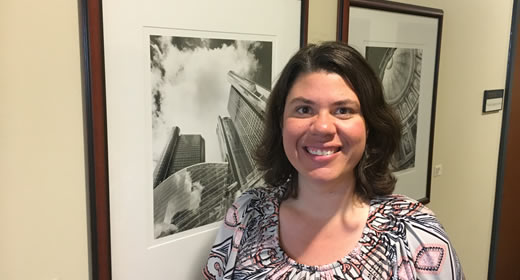
Sarah Mills is working to dispel rumors and inform rural Michiganders of the pros and cons of wind farm energy.
Mills, a post-doctoral fellow at the Ford School’s Center for Local, State and Urban Policy (CLOSUP), received an $80,000 grant from the Charles Stewart Mott Foundation to survey wind farm community residents.
Mills surveyed over 1,200 farm landowners in Michigan townships. Her report, ‘Farming the Wind(link is external),’ concluded those with turbines on their property were more likely to invest in their farms, purchase more farmland, and believe in the benefits of wind turbines. She’s now expanded that research to include non-farmers, for 3,200 landowners total.
Unlike most research funders, the Mott Foundation also provided support for public and policy engagement at the conclusion of her research. Mill's work has been featured in local news stories across the state, like the Midland Daily News and ABC 10 UP.
So with her research findings in hand, Mills has visited 14 local governments and a handful of county associations since the start of the year. She will also host a webinar in early December for township officials to listen live. In each community--all contemplating wind farm development--Mills offers non-biased information based on her report.
Wind farm energy can be a contentious topic in small towns, she says. And many residents are trying to decipher whether wind mills will provide economic value, or simply create a social nuisance. “I’m an outsider in these communities,” Mills says. “I recognize that and so I don’t try to make a decision for them.”
Many residents have expected Mills to discuss the effects of wind farms on the environment and climate change. However, she’s yet to do so. Of those she surveyed, 65 percent of land-owning residents in communities with wind turbines don’t believe in climate change. Instead, she focuses on resident concerns that often spur from rumors--that large development will break long-standing relationships between neighbors in small townships, or that turbines cause human health problems--but Mills' research proves otherwise.
Even so, Mills finds that tensions can arise, especially in rural townships trying to foster a quaint, tourist-driven economy, while maintaining a sustainable agricultural base. To add to the complexity, most townships Mills visits have so few residents, one wind turbine would satisfy the entire area’s energy needs. A single turbine can sustain 500 to 800 homes, but energy developers often wish to site 30 to as many as 70 turbines in a single area to achieve economies of scale.
On the other hand, wind farm developers offer direct payments to landowners who, according to her research, use the additional money to reinvest in their farm. Additionally, developers would pay property taxes, directly benefitting the local government, which would use those funds to provide services for local residents.
“There’s often a fear of the unknown when you propose changes in a small community where there might not be any staff to help gather information,” Mills says.
When the tour ends in December, Mills hopes the towns she has visited will feel they’ve been given enough information to make informed decisions about how wind farms will impact their communities.
Mills’ Michigan wind energy tour will end in December, but she hopes to secure additional funding to expand her work to other rural communities within the Great Lakes states like Illinois, Indiana, and Minnesota.
--By Olivia Lewis (MPP '18).